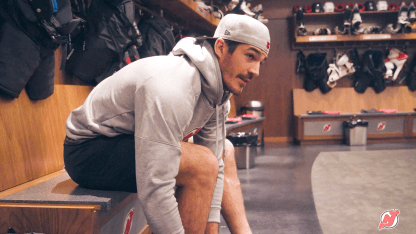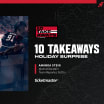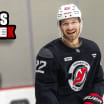It was a coincidence that Sunday, the day Brian Boyle returned to the ice to practice with his Devils teammates after being diagnosed with chronic myeloid leukemia last month, also was the day of a practice that was open to Devils fans.
Boyle's return to locker room a big boost for Devils
Brian Boyle skated with New Jersey for the first time since being diagnosed with CML

By
Jesse Spector @JesseSpector / newjerseydevils.com
The happenstance meant two things. One was that New Jersey was able to give a warm welcome back to the 32-year-old center. The other was that Boyle, after skating by himself for a month, had the experience of getting reacclimated to real hockey in front of bleachers full of people.
"That was different," Boyle said. "There were moments where I was a little embarrassed. I mean, that happens. That happens every year. It's not on NBC Sports, at least, but it happens. It was good. It was good to see the fans, and it was a nice little warm welcome for me, too, so that felt nice. I tried to keep my head in the game in practice, but I heard them, and it's much appreciated."
That's Boyle, simultaneously self-effacing and comfortable in his own skin, accentuating the positive while acknowledging the difficulty of an unusual situation. Who Boyle is as a person is one of the reasons, along with his reputation as a glue guy for playoff teams with the Rangers, Lighting, and Maple Leafs, why the Devils signed him to a two-year deal in July.
"We brought him in here to be a real important part of our team on and off the ice," Devils coach John Hynes said. "Even though he hasn't been around a lot, you can see the respect that he has in the room with the players, the guy that he is. And we're a couple of weeks in, so it's good to be able to get a guy like that back. It rejuvenates your team and helps them come together a little bit."
Said Taylor Hall: "He's not only going to be a big boost to our on-ice play, but just having his morale in the locker room and his leadership is huge. If he hadn't been going through the leukemia like he is, he'd still be a huge leader in this room. Now that he's showing the effort and discipline that he's shown the past few weeks, it's hard not to rally around that."
That only figures to be truer as Boyle works his way up to game readiness, and it's still too soon to say when exactly he will make his Devils debut. There is a difference between being cleared to play, as Boyle has, and being up to speed for NHL action. The timing of Boyle's return to practice is good, though, as Sunday was the second day in a stretch of six without any games - a rare in-season chance for the kind of intensive practice Boyle needs.
"I knew it was going to be a battle type of practice," Boyle said. "Guys should know if you're cleared and you're out there, you have to work hard. That's what guys have been doing, so it was a good opportunity for me to get in."
That is the kind of example the Devils wanted Boyle to provide even before his cancer diagnosis, putting into motion the idea that if you're healthy enough to go, you go as hard as you can. Boyle has been champing at the bit to do so, as he has been feeling much better since two weeks into his treatment, but it took more time for his condition to match his feeling and get past the checkpoints required for medical clearance.
Boyle's treatment is ongoing, with a regimen of pills, dietary changes, and tests that he calls "a minor adjustment," "pretty normal for me now," and "very easy to stay disciplined with." If you didn't know better, you could be convinced that Boyle was coming back from a really nasty flu bug, not leukemia. But for someone who is one of 13 siblings, the challenge of the last month has been less physical and more mental: not fully being able to be part of his second family, his hockey family.
"It's a lot to get out of bed every morning and get here before everyone else gets here, and get off the ice when guys are starting to come in," Boyle said. "That's probably the hardest part. … It's been difficult in a lot of different ways. Guys here have been phenomenal - players, coaches, [GM] Ray [Shero] especially, they've been great. The medical guys - the medical guys are sick of me, but they've been unbelievable. It's been a lot of fun to get to know them that way.
"There's less pressure on me in terms of playing games, and I'm fortunate to be here, because it's not a great spot to be in, coming into camp and not being able to play, and they've done an unbelievable job of making me feel comfortable. Guys are sympathetic. When guys get injured or something happens, guys typically reach out, and there's a younger group here, a lot of younger guys, but they're mature enough that they know, and they've been great in terms of reaching out and asking how I'm doing, asking about my wife and my kids and stuff. It really is a close-knit group, and I can't stress how fortunate we are to be part of this organization."


















